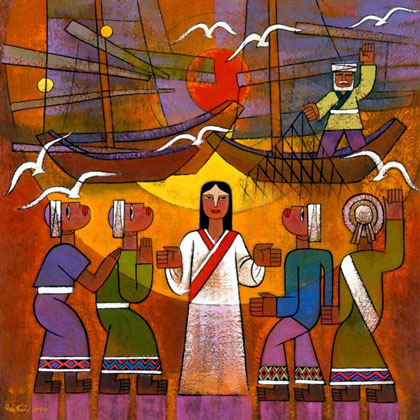 Process and Method, Not Currying Favor and Not Begging
Process and Method, Not Currying Favor and Not Begging
It’s an odd mixing of metaphors that leads Jesus to empower his disciples, in Matthew’s telling.
They are like lost sheep without a shepherd, Jesus remarks about the crowds who come out to hear him. And whether he is saying this to himself or to his followers, we really don’t know.
What he does say to his followers is, The harvest is ready but the harvesters are few. So pray God to send laborers into the harvest field. And then he returns to the image of lost sheep again.
Harvesting sheep is a non-sequitur. Harvesting the lost – well, that is an interesting thought.
Are the disciples found, or are they harvested? And were they lost before they became Jesus’ own?
Matthew names the twelve: Peter and Andrew; James and John; Philip and Bartholomew; Thomas and Matthew the tax collector; James the son of Alphaeus and Thaddeus; Simon the Cananean; and Judas Iscariot.
If Jesus can make mistakes, choosing a man who will turn on him in the end, then surely you and I and the rest of the world can, too.
Judas, the whistleblower, rewarded by the powerful and hated by the rest of the world, is iconic in this world.
Something of all of this has passed before us in the past few weeks. The former FBI director, James Comey, was praised, assured of his tenure in his job, doubted, and then fired by the President, who then called him a showboat and a grandstander, and in the end, an obstacle because of the investigation into Russian connections in the administration.
The firing was ugly and humiliating, and engendered much public sympathy.
And then there was the public hearing, a trial-like affair, in which a much too tall man sat hunched in a chair over an ordinary desk, and shared his many notes and his recall of a turbulent relationship.
The interpretations of what happened are many, diametrically different, and without a clear conclusion. This is not true for Judas, though it may have ben, briefly, at the time.
But I want to pursue a different consideration here. I want to pursue the harvest, and especially the harvest of the lost.
Because harvesting is a process, and farmers know it well. It has to be done methodically, and no matter how many –or how few- labor in the field, the harvest has to be carefully brought in.
And I am not sure I have thought of the calling of disciples in terms of this process, and of the harvest, before.
We tend to romanticize the idea of a call, as something that combines the effects of winning a beauty contest with preparing for travel in space.
But Jesus is not thinking that way at all, in Matthew’s account. He is thinking of the crowds, their milling about, their following after him, and that lost quality he can see in their eyes, as they search his, hungrily, and as they follow after him, seeking a good place, a safe place, a greenly truthful place, which he calls the kingdom of heaven.
They are like lost sheep without a shepherd, he says. But what he says aloud are practical words: instructions, how to cast out unclean spirits and cure every disease and sickness. It is this the twelve are sent out to do for the countless multitudes. Practical, methodical, meaningful but rather ordinary things.
Yes, yes, I know that having yourself rid of an unclean spirit looks, in the old paintings, like a real Wow! In fact, it may be more ordinary: you can lose your bitterness by finding your confidence that there is a way out of your pain. You can lose your suspicion, your expectation of the worst, by meeting the best in someone. Unclean spirits are not usually psychotic demons. Though they sometimes are.
The point about methodical things is, they are a process. Like democracy. Democracy is process-based, in order, it is hoped, to avoid toady-ism and boot-licking. Process can be manipulated, we know that. But it can be also be set free, cleaned up, renewed.
David Brooks commented on Friday that President Trump really does not believe in process, he believes, instead, in clannishness, in family relationships, in blood loyalty, and in acts of fealty by those who are not your kin, and also those who are.
A lot of the known world operates this way. In most of the nations of the earth, favor has to be obtained with money and fealty. No matter what you are trying to harvest, you have to go about it this way.
But this is not the way in the kingdom of heaven. In the Old Testament God held out for law and judges rather than monarchs, for a long, long time, till the people’s clamor for kings wore God down.
And in Jesus’ ministry, he renews this sense of living by order in the commissioning of his disciples to specific tasks, for which he has prepared them: healing what is lost in people; setting their spirits free to join his in lives of loving kindness and truth.
Jesus is not calling disciples for saintliness, or to wear haloes. He is not calling them to become Bishops or to sit on thrones. He is commissioning them to walk out into the world of human need as he has been doing, and to meet the needs in the ways he has taught them.
We’ve heard Jesus confront demons, in many stories. He is stern in addressing them, and does not waver. He is methodical in his insistence that they must depart. He casts them away. One time into swine. Other times, merely out of his presence.
All of this is about the harvest. And what is that? It is not something stored up in barns, but something freed up to live fruitfully, something given to provide sustenance for those are yet to come along. Harvest has a purpose, and it is not to celebrate the laborers, but to become sustenance for many in the time ahead, the time before a new harvest can be brought in.
There has never been agreement about what the harvest of ministry really is. There has been some truly sick imagination, as Native Americans, sent to religious schools to try to root their culture out of their hearts and minds, can tell us. There has been some excellent imagination, as great universities and teaching hospitals, established as actions of faith, can demonstrate.
But most of all, the harvest remains a process. And a process is the clear alternative to a clan relationship, to a family, related by blood lines or by fealty to a creed or a tribe or a nation. A process is not based on loyalty, for the harvest of truth can occur when those who dislike and distrust each other reveal what they know in a legal process.
And we need to remember, in ministry, that we are in the field to produce from the method of our ministry, something nourishing for the lost, something for the many, not the few, something that has nothing at all to do with clan or kin or submission of one human being to another.
In doing this, Jesus says, the kingdom of God comes near.
_____________________________________________________________________________________________________
Image: Calling Disciples, by He Qi, 2001, Nanjing, China. Vanderbilt Divinity School Library, Art in the Christian Tradition.














